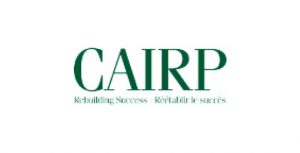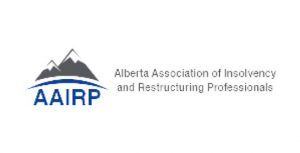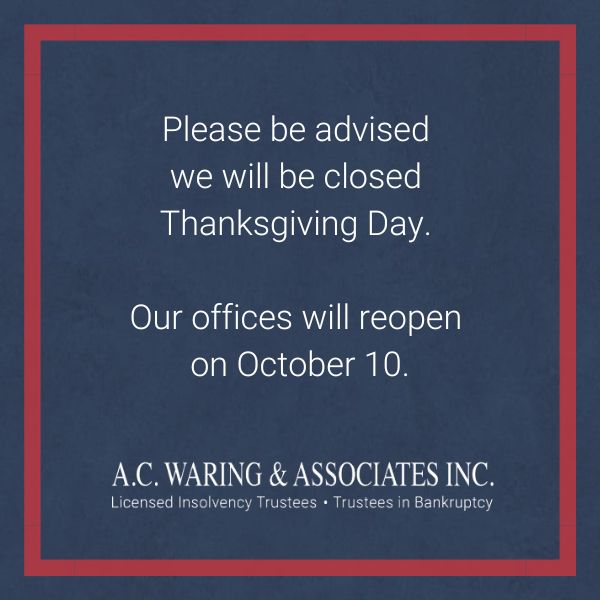Personal Bankruptcy Protection in Edmonton & Central/Northern Alberta
Bankruptcy protection may seem scary and embarrassing to those facing deep financial pressures to repay unresolved debts. At A.C. Waring & Associates, we can help you unravel your situation, examine alternatives, point out available options and advise you of your possible solutions.
Should bankruptcy be the best solution for you, here are some frequently asked questions and answers.
If I Choose Bankruptcy, Will I Get Rid of All of My Debts?
There are some debts that you are responsible for despite bankruptcy, including, but not limited to, secured debt (only if the asset is kept), child and spousal support payments and arrears, student loans less than 7 years from the last day of attendance, court-ordered fines, and debts from fraudulent activities.
Can A.C. Waring & Associates Get Immediate Financial Relief for Me?
The first step in obtaining assistance is to make contact. As professionals in the field, we can provide you with the best source of information about your options. We handle debt stress situations daily. Each case is evaluated individually, whether this is for debt repayment planning, credit counselling, discussions about orderly payment of debt, consumer or business proposals, or bankruptcy protection.
Once the problem has been determined, we can assess your options and discuss applicable solutions. Call for an appointment or drop in and see us. Visit us at First Edmonton Place in downtown Edmonton or call us for a free consultation. After hours, please leave your message.
What If I Can’t Come to Your Office?
A.C. Waring & Associates offers a free consultation, whether over the phone or in person. You can call us at 1-800-463-3328 from anywhere in Alberta or 780-424-9944 within the Edmonton region.
We understand that taking a step in contacting us may be very difficult to do. We are here to help and will advise you to the best of our ability. If you cannot visit us due to hospitalization, hospice, or long‑term care, incarceration, or other unique circumstances, we may certainly endeavour to arrange personal consultations at your site.
How Do I Know If I Need to Consider Bankruptcy?
You need sound financial advice if you are overwhelmed and stressed about your personal or business financial situation.
Are you unable to pay what you owe, living off of loans, credit cards or personal lines of credit, while your debt continues to increase? Are you incurring or worried about wage garnishees, payment demands, and foreclosure or utility cutoffs due to unpaid bills? These are all present or potential stressors that may demonstrate financial danger signals in your life.
Regardless of how the debt was incurred, the reality is, you cannot repay the spiralling debt load.
How Do I Know I’m at a Personal Breaking Point?
Are you overwhelmed, embarrassed, stressed out, frequently angry, or feeling down about your debt? Are you experiencing:
- Difficulty sleeping, anxiety, poor eating habits, or depression?
- Anger and/or anxiety over not knowing what to do or whom to ask for the “right” advice?
- Fear of “losing” it all, “hiding” debts, or avoiding others?
What Caused This Debt Crisis?
Many individuals struggle with repaying their debts. At A.C. Waring & Associates, we realize some conditions may be beyond your control and can lead you deeper into debt. These circumstances might include:
- Losing a job, marital separation, divorce, becoming ill, gambling, needing costly medications not covered by benefits, natural disasters not covered by insurance, and investment losses.
- Marriage to a spouse already carrying debt overload and/or living with large wedding expense obligations
- Shopping addictions: sometimes, needs and wants get blurred when we feel we “have to have it”
- Co-signing a loan for a friend or relative who is not financially stable and you wind up having to pay for the loan
- Making minimum credit card payments instead of paying full amounts each month
Other times, a combination of internal and external circumstances creates monetary challenges. For example, buying a home with a large mortgage, expecting a baby, buying a new car, or failed investments can all lead to increased debt. Many people also have financial dependents to care for, such as children, a spouse, or elderly parents who have financial difficulty. We understand these things happen.
When it comes to getting debt help, it does not matter whether a situation beyond your control brought you into financial hardship or if your problems arose from how your finances were handled. The professionals at A.C. Waring & Associates can talk to you about the available alternatives and suggest various solutions that work for you.
Who Turns to a Bankruptcy Trustee?
Financial hardship can come at any time. Most people turn to a trustee when:
- Creditors call their loans in
- Credit card companies no longer allow more credit
- Utility companies threaten cable, hydro, or gas discontinuation
- Businesses cannot meet payroll or operational payments
How Can the Edmonton Bankruptcy Trustees at A.C. Waring & Associates Help Me?
A Licensed Insolvency Trustee takes the burden away from you. No more creditor calls, collection notices, foreclosure notices, repossessions, or debt-collection suits. Once bankruptcy is formally filed, the trustee will contact your creditors and collection agency calls to your home should stop.
We are federally licensed and can act on your behalf to derive the best financial solution for your circumstances. We will review your entire financial situation and help you understand what options are available. As professionals in debt management, we can help you obtain immediate financial direction, counselling, and situation-changing debt decisions. Everything we do is regulated through the Bankruptcy and Insolvency Act.
What If I’m Too Embarrassed to Ask for Help?
You are not alone in your financial predicament, and our consultation is strictly confidential. More people than you think are, or have been, in a financial crisis. We have served thousands of debtors over the years, and our staff is highly sensitive to the difficult challenges faced by those in need every day.
The risk of not obtaining professional help may include foreclosure, lawsuits, or a formal garnishee of wages by creditors. The other risk of not getting professional help to solve your indebtedness includes running out of money, even if you are working 3 jobs. Get professional assistance now.
If I Choose Bankruptcy, How Much Will it Cost?
Costs are federally regulated. They are individual to each situation, including family size, assets, and income. Also, if you have surplus income while bankrupt, you may be required to make some additional monthly payments toward your debt.
Is it True That Not Everyone Can Qualify for Bankruptcy?
Bankruptcy is one option for those who are unable to repay their debts as they come due. The factors determining whether bankruptcy is the best option include your income and assets.
Depending on the size of your family, you are allowed to earn a certain amount of income per month, set by the federal government. Also, you are allowed to keep a certain amount of equity in assets like your home, vehicle, household goods and furniture, tools, RRSPs, farming equipment, and certain excess income.
If you earn too much or have too much equity in your home or other assets, you may have to pay more and/or extend the time you spend in bankruptcy repaying your creditors. In this situation, we recommend filing a Consumer Proposal.
If I Choose Bankruptcy, Will My Job Be Affected?
Bankruptcy can affect your ability to work in certain jobs or industries, especially if you are licensed or bonded. Your trustee will talk to you about other alternatives that may be open to you.
If I Choose Bankruptcy, How Will My Credit Report At Equifax And TransUnion Be Affected?
Any negative situation with creditors can affect your credit rating. Often credit ratings are already at their lowest before people seek debt relief. Creditworthiness is based on your creditors’ experience with you in your past, irrespective of bankruptcy.
Having a credit card delinquent for 120 or more days could terminate your ability to get credit from anyone else. The majority of people going bankrupt already have derogatory information in the credit bureau. Any derogatory information on your credit bureau, by provincial regulation, remains in place at the credit bureau for 6 years, even if you pay the debt off.
A first bankruptcy remains on your record at Equifax and TransUnion for 6 years from the date of your discharge. A second bankruptcy remains on your record for 14 years from the date of your last discharge.
How Long Can I Expect to Be in Bankruptcy?
For most individuals, 9 months is the minimum length of time to be eligible for a discharge of bankruptcy. Bankruptcy can be extended beyond 9 months if the court orders an extension. Those with income significantly over the income guidelines will be in bankruptcy for 21 months.
Other factors may include whether or not this is not your first bankruptcy, if you have failed to complete one or more of your duties in bankruptcy, and/or if your discharge is opposed by a creditor, trustee or the Superintendent of Bankruptcy, which occurs occasionally.
If I Choose Bankruptcy, How Do I Start Filing?
Call us. Once you have discussed all your options and have decided to file for bankruptcy, we can prepare your information for the process.
Create a list of your income, assets, current and past debts, and transfers of funds or property, as you will need to file a sworn financial statement. Keep your house and car loan payments current if you intend to maintain these assets after filing for bankruptcy. If you intend to keep your condo or home, it is a mistake to let condo fees or mortgage payments fall into arrears.
Useful Terminology
Debt Repayment Plans
These are plans sculpted between you and your credit counsellor. They are arrangements to repay debt based on what you can afford and to advise you of other applicable options. Typically, this decision is made in the beginning stages of debt management to help you get your finances on track.
Bankruptcy
Bankruptcy is a legal process you can enter if you have insufficient, non-exempt assets to pay your debts. In bankruptcy, the assets of a debtor (business or individual) are distributed among their creditors and the unpaid balance of the liabilities held is relieved. The bankrupt (or insolvent) is typically the initiator of the proceedings.
Consumer Proposal
A Consumer Proposal (or Business Proposal for a business) is an arrangement formally negotiated with creditors. As your administrator, the bankruptcy trustee obtains a legally binding agreement with creditors on your behalf so that you can pay the debt owed (at a portion of the original amount owed), and your creditors agree to forgive the balance.
Debt Consolidation
Debt consolidation is the act of combining your loans or liabilities into a single account that is used to pay off the individual debts, usually involving another loan. A.C. Waring & Associates discusses debt consolidation as the consolidation of present debts, which does not include acquiring more debt such as loans. This alternative pools your current debts into one monthly payment to settle the debt over time.
The trustee negotiates this with creditors officially. This method often results in a great reduction of the original amount owed. This then becomes a Consumer Proposal.
Where To Find Us
Find us in the First Edmonton Place building on the corner of Jasper Avenue and 107th Street, behind the Corona LRT Station. Street meter parking is available along Jasper Avenue as well as 106th and 107th Streets, and paid surface parking is off of 106th Street, and underground parking for First Edmonton Place is off of 107th Street.

A.C. Waring &
Associates Inc.
- First Edmonton Place
410-10655 Jasper Ave NW - Edmonton, AB T5J 3S9
Contact
Information
- Phone: 780-424-9944
Hours Of Operation
- Monday: 8:30 AM – 5:00 PM
- Tuesday: 8:30 AM – 5:00 PM
- Wednesday: 8:30 AM – 5:00 PM
- Thursday: 8:30 AM – 5:00 PM
- Friday: 8:30 AM – 5:00 PM
- Saturday: Closed
- Sunday: Closed
Our Google Reviews

Our Testimonials
Dealing with the wonderful people at A.C. Waring has made a traumatic experience hurt a whole lot less.
Everyone there has treated me with nothing but the utmost respect and kindness.
I have nothing but high praise for everyone there.”
J.G.
“Thank You!
Thanks to Stan and everyone at A. C. Waring for making this process simple and easy.”
R.C.
“I appreciate your kindness
Kim was really good. I always felt calmer after talking with her. Please let her know I appreciate your kindness.”
C.G.
“Shanaz, thank you for your understanding, thoughtful support and advice through an extremely difficult time assisting us in resolving our financial difficulties and allowing us an opportunity to get back on our feet.
We are extremely grateful to you and your company for the important service you provide to people and families facing financial adversary in these trying times.”
M & H.
“Thank you!
Dear Pat, Thanks again for your Totally Awesome help!!”
M.V.
Fern,
Thank you so much for making my life better. It means so much that I can at least get up in the morning! Thank you again.
J.K.
“Shanaz and Team!
Our heartfelt gratitude to you all. You provide such an important and life changing service and there are no words to express how grateful we are for all you do.”
K & R
“Although we are not done with our bankruptcy yet we just wanted to say thank you for taking a totally overwhelming situation and making it so much easier for us. You have explained everything along the way and reassured us that we will get through this. Stan has always been there when we had questions. I’m so glad you have been there for us. Thanx for all you do.”
S & G
“To the most sweetest Lady EVER…
Thank you so much for being there for us, for helping us out and for giving us a second chance at our financial life. If it wasn’t for you we would not be where we are right now and probably would not have been able to move back home this quickly and unexpectedly.
So thank you for all that you have done for us and continue to do. You and your company have been a life saver, changed our lives (both us and kids) in all aspects and ways possible! We will forever be grateful to you and hopefully one day be able to physically see you and give you a HUGE hug.
Take care, and if you ever travel our way to Eastern Canada, please contact us…our door will always be open to you and your loved ones!!!”
J.B. and L.B. Family
“Very grateful!
Dear Shanaz,
Thank you for all you’ve done for me, I am very grateful for you! God bless you Shanaz.”
JT
“What truly matters…
Thank you so much for taking the time to speak with me today. I know how incredibly busy you are, yet you made me feel like a special person and someone who is valued. You probably make all of your clients feel that they.
Please tell others to never give up hope and to keep their loved ones close, as that is truly what matters.”
H. & G.
“Thank you so much!
It was great meeting you. Thank you so much for explaining the bankruptcy process to my brother and I. You are very knowledgeable and friendly and you helped my brother a lot.”
E.S.
“Shanaz, Thank you for your guidance and expertise.
Shanaz, Thank you for your guidance and expertise. I appreciate all the help you have given me. Seriously, Thank You from the bottom of my heart! (I’m no doctor, but apparently that’s where the most grateful part is.)”
C.M.
“Thank You
Arthur, Heather and Beth,
Thank you 1000 x 5!!”
M.S.
“Thank you for your help!
Hi Shanaz, I had a second and wanted to thank you for your help!”
L.D.
“Thank you for all you’ve done
Thank you so much for all your help! I appreciate all that you have done for me!”
C.
“Thanks and Appreciation
With thanks and appreciation for your help”
D.A.
“Thank you
Just want to say Thank You for all your help.”
J.T.
“Thank you so much for all your kindness, wisdom and support.
We are so grateful for you.
We will gladly refer our friends and family to you.
Many beautiful blessings in your life.”
T. and T.B.
“Good Morning
I would like to thank the staff for helping me during my bankruptcy.
Thanks once again.”
J.B.
“Happy New Year to Everybody
Because of you guys i was able to have a better holiday.
Thank you so much.”
G.L.
“Thank you and your Company for your assistance
I am writing this letter to thank you and your Company for your assistance at my hard times. I was your client in 2015-2017. At that period you supported me both financially and even psychologically. Your professional advice and tact helped me greatly to overcome my temporal financial difficulties and to keep the power to live further. Moreover, you and your highly qualified personnel, especially Beth Bui, who was my adviser at that time, did your best. As a result, I even managed to avoid my depression.
Once again, I just wanted to let you know how much I’ve appreciated your advice and assistance.
Yours truly,”
I.K.
“Much appreciated.
Thank you Shanaz, for all your help. Much appreciated.”
Mr. and Mrs. B
“Your staff are great
Arthur, it was good to talk to you. Your staff are great too and I have learned a lot. Thank you.”
G.
“Thank you for all the help
Dear Shanaz,
I want to thank you for all the help you have done for me. Hope things are well with you and your family.
Thank you so very much,”
J.T.
“Such a good experience
Such a good experience. After a change in finances left us without many options, so glad A. C. Waring and Associates have been there every step of our recovery process.”
R.F.
“I can’t thank you enough
Dear Shanaz:
Hope things are going okay with you and my accounts. If You need to call me please do. I can’t thank you enough for what you are doing for me. Please take care,
Yours truly,”
Joyce
“Thank You for Being Thoughtful
To the A C Waring & Associates Family,
Thank you for being so thoughtful. You can’t imagine how much it’s appreciated.”
M and R P-K
“Appreciate Your Consideration
Hello Shanaz,
You are a very special and dear person. I so appreciate your consideration!
Sincerely,”
DB
“Always There for Me
To AnnMarie:
Just a Thank You for all your help at a time in my life that was very hard for me. You were always there for me even when I could be a pain. Your help through this process helped me so much. I would like to thank everyone that had a part in the process from beginning to end. Thank you all. Also I feel I should include the wonderful man that hired all these great people, Mr. Arthur Waring. Bless you all. Thank you all again for all your help through the bankruptcy. All the best in all of your futures. You are a great bunch of people. Thank you with all of my heart.”
V.N.
“Made Our Lives Better
Shanaz,
My husband and I cannot thank you enough for all of your assistance. You have made our lives so much better. I hope you have a wonderful New Year.”
Mr. and Mrs. H
“Thank You
Arthur, Heather and Staff,
Thank you for all your help.”
Mr. and Mrs. C
“Appreciated Your Help
AnneMarie,
I appreciated all your help in this solution. Wishing you and yours all the best!”
RG
“Truly an Angel
Shanaz,
Thank you for everything you have done for us and our family. We will keep referring to you! You truly are an Angel.”
M
“Thanks for everything
Hi Fern,
Thanks for everything. Sept 9th was stressful & exciting! Soooo glad I’m “done”.
Thanks-thanks-thanks.”
C.K.
“Helping You When You Need It
Merry Christmas:
I’d like to thank you for getting me through a tough time.”
R
“Thank you for your patience
Fern and Arthur
Thank you for your patience in this trying period for me. Your patience and calmness have been very much appreciated as I worked through this. I never in my life thought I would be going through bankruptcy, it has been most disconcerting. That said, there is reassurance in Karma now that the police have just about finalized the materials to charge and try Mr. C. Thank you once again.”
W.K.
“Thanks to You Both
Hi AnneMarie and Dana,
I just want to take a minute to thank the both of you for all of your assistance in getting me through this.”
DJ
“Special & Dear
Hello Shanaz,
You are a very special and dear person. I so appreciate your consideration!”
DB
“Much Appreciated
Dear Fern,
I appreciated everything for your goodness to me. God bless.”
RB
“Made Our Lives Better
Shanaz,
We cannot thank you enough for all of your assistance. You have made our lives so much better.”
S and SH
“Helping You Find a Fresh Start
Dear Laverne,
Thank you for all your help, patience and understanding during this last year in my bankruptcy. I am glad to put this part of my life behind me and start fresh. I could not have done it without the support you and the staff at A.C. Waring & Associates Inc. offered me.
Thank you,”
A
“Life a Lot Less Stressful
Thank you, Shanaz, again, for all that you have done for us. Too bad we did not do this a lot sooner. It sure opened our eyes and life is a lot less stressful when you don’t receive phone calls from creditors. Thanks again.
God bless you all.”
L and DR
“Great Professionalism
A.C. Waring & Associates,
I would like to thank you very much for the great effort you have shown in arranging the many details required for finalizing the contract design.
Great professionalism.”
F
“Thanks So Much
This poem sent to Shanaz:
“Some impart wisdom or comfort and care.
Some point out the path, and some take you there.
Some warm the heart with a human touch.
You have all these gifts…
Thanks so much.”
M and AA
“Personal Service
Thank you Mr. Waring and Laverne:
I thank you for all your help in encouraging me through this insolvency. I am finally getting on my feet again.
Thanks,”
R
“Beyond Expectations
Hi Shanaz,
I can’t thank you enough, but I hope you know that Dave and I appreciate everything you’ve done. We were even able to put some monies aside. It is a very good feeling to be able to pay for things in cash. Thank you again. We will be in touch with you later.”
L and D
“Professional Support
Dear Laverne,
Just a short note to thank you for all your help involving my file (sorry I’m a bit tardy sending you this card). Approximately mid-August I experienced a relapse and I just started getting back on my feet. I sincerely appreciate the support and guidance you afforded me! All the best to you in the future, take care.
Sincerely,”
D
“Debt Experts
Hi AnneMarie,
I am sorry for the late reply. I received the discharge 2 weeks ago. At work, there’re a lot of things to do. Home is no different. I thank you and A.C. Waring & Associates Inc. very very much for helping me. Without A.C. Waring & Associates and you, my life would have been miserable. With your help and ADDAC classes, I am on the right track. I want to be on this track forever. I don’t want to think of the place that ruined my life. I was not very smart when I made this big mistake.
Thank you AnneMarie,”
W
“Much Appreciated
Fern and Arthur,
Thank you for your patience in this trying period for me. Your patience and calmness have been very much appreciated as I worked through this. I never in my life thought I would be going through a bankruptcy. It has been most disconcerting. That said, there is a reassurance in karma now that the police have just about finalized the materials to charge and try Mr. C.
Thank you once again,”
WK
“Help Starting Over
Good Morning Shanaz,
All of this (debt) has been weighing on my mind for far too long. I can’t thank you enough for all your advice, help and time.
You are truly a beautiful lady with a genuine soul. I hope everything works out for me. I just need to start fresh and over…”
J.C.
“Kindness & Compassion
Thank you for your kindness and compassion. May God richly bless you and your family.”
M. and S.
“Made it Come Through
Thanks for all the effort you put into marking this come through. Thank you!”
N.C.
“Sincere Appreciation
A very special thank you with sincere appreciation.”
K.V.
“Thank You for Your Kindess
Thank you, Heather, for being so patient and kind to me. Many blessings.”
D
“All the Best for 2015
Heather,
All the best for 2015. Thanks!!!”
J and M
Blog
Handling the Debt of a Loved One Before or After They’ve Passed
Debt ManagementLosing a loved one is always difficult, and it can be even harder when you have to handle their finances. If you are their power of attorney (POA) while they are still alive, you could be responsible for managing various debts such as utility bills, subscriptions, taxes (personal and property), credit cards, loans, and mortgages. As the […]
How To Deal With Overwhelming Credit Card Debt
Credit and DebtDebtDebt ManagementCredit cards help cover costs in advance—they do not provide free money. They are a loan that requires repayment within the credit agency timelines, which many people can struggle with. If you are struggling to pull yourself out of credit card debt, there are strategies you can use to take control of your situation, including […]
What Your Credit Score Actually Means
Credit and DebtYour credit score can be a significant factor when you are seeking a loan, mortgage, or even rental accommodation. Your credit score is essentially a rating of your creditworthiness. It is important to know how different types of debt can impact your credit score so you can responsibly manage it. A credit score is not […]
Handling the Debt of a Loved One Before or After They’ve Passed

Losing a loved one is always difficult, and it can be even harder when you have to handle their finances. If you are their power of attorney (POA) while they are still alive, you could be responsible for managing various debts such as utility bills, subscriptions, taxes (personal and property), credit cards, loans, and mortgages. As the […]
How To Deal With Overwhelming Credit Card Debt

Credit cards help cover costs in advance—they do not provide free money. They are a loan that requires repayment within the credit agency timelines, which many people can struggle with. If you are struggling to pull yourself out of credit card debt, there are strategies you can use to take control of your situation, including […]
What Your Credit Score Actually Means

Your credit score can be a significant factor when you are seeking a loan, mortgage, or even rental accommodation. Your credit score is essentially a rating of your creditworthiness. It is important to know how different types of debt can impact your credit score so you can responsibly manage it. A credit score is not […]
Professional Affiliations





